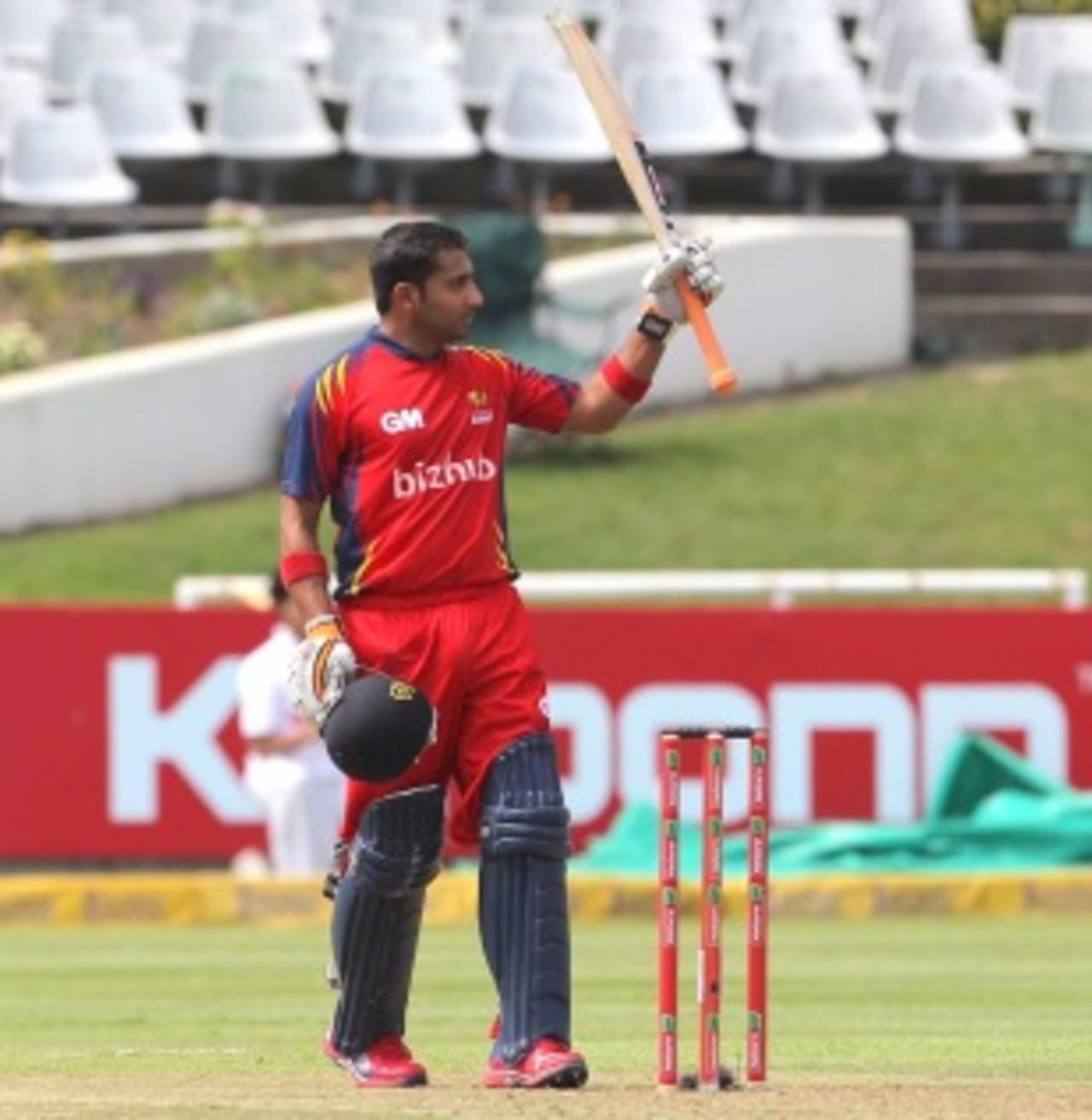A mostly South African and Australian selection
ESPNcricinfo picks the XI of the tournament

Gulam Bodi struggled in his first game, but thereafter notched up productive knocks for Lions • Getty Images
208 runs, three half-centuries
Not blessed with the most attractive technique, Bodi had a torrid time in his first outing, but he turned it around and scored three half-centuries. Conditions were not ideal for stroke-making in the first six overs because the ball darted around but Bodi took a patient approach, and that proved critical in Lions' ability to put up solid scores in most games.
226 runs, strike rate 155.86
Every time Sydney Sixers took the field, their trio of young fast bowlers hogged the attention and in the background, Lumb, their opening batsman stayed busy, consistently giving the team a start so that their batting never came under pressure. He reserved his best for the final, when instead of ambling towards a middling target, he chose to blast his way to an unbeaten 82 that won him the Man-of-the-Match award and took him to the top of the batting charts.
162 runs, strike rate 142.10
One of the USPs of the Champions League is that it allows lesser-known players a chance to show their prowess. Henry Davids, with 12 years of experience, is one such player who shone. Davids, diminutive in presence, was the more attacking of the two Titans openers. He scored two half-centuries, the second of which came in the semi-final - the only game that tested Sydney Sixers.
176 runs, strike rate 130.37
The 36 year-old batsman showed yet again that big hitting is not the only way to thrive in Twenty20s. McKenzie hit 12 boundaries in his unbeaten half-century during Lions' first win, against Mumbai Indians, that set the tone for the team's campaign. Another noteworthy innings came in the semi-final, when he lifted the team to a competitive total with a risk-free charge.
160 runs, 10 wickets
Auckland Aces were in the reckoning for a semi-final spot until their last match. The architect of their campaign was Mahmood, their imported allrounder who was their leading run-scorer and top wicket-taker. With two half-centuries and one five-for, Mahmood was arguably the most valuable player until the knockouts.
133 runs, 11 catches
He may have lost his Test spot, but Haddin was not only the best wicketkeeper in the Champions League, he was also instinctive with his captaincy. Add to that his batting at the top of the order and Haddin is a valuable pick. His inspired moves of opening the batting with Steve O'Keefe in the semi-final and opening the bowling with spinners caught the opposition off guard and showed that Sydney had more ways to win than just with their fast men.
140 runs, strike rate 129.62
A quintessential lower middle-order player with the job of performing in nervy situations, Symes showed his worth in contrasting scenarios. Against Chennai Super Kings, he smashed an unbeaten 39 off 23 balls to gives Lions their first win, and then compiled a controlled 27 off 22 balls against Yorkshire to take Lions into the knockouts. In the final, his half-century gave his team something to defend after a horror start. He also chipped in with few overs of useful left-arm spin and was energetic in the field.

Six wickets, economy 7.61
Morris has been earmarked in South Africa as one for the future and in the tournament he showed why. Morris hustled batsmen with his raw pace and disconcerting bounce he extracts with his tall frame. He was expensive at times, but when he got the ball on target, he caused problems for everyone, like in the semi-final against Delhi Daredevils, when he took the wickets of David Warner and Kevin Pietersen in his four over spell that cost only seven runs.
Seven wickets, economy 4.70
While the attention was focused on Mitchell Starc and Pat Cummins, who impressed in the World Twenty20 in Sri Lanka, Josh Hazlewood proved to be the hardest to hit because of his control over pace and direction. He consistently got the ball to leave the batsmen from short of length and his economy of 4.70 was among the best for a fast bowler in the tournament.
14 wickets, economy 7.20
Tall, quick and skillful, Starc was the leading quick in the Sydney Sixers side. Starc's pace and movement caused trouble for batsmen in the early overs and his accuracy fetched him wickets, when batsmen looked for runs in the later overs. Starc was also consistent through the tournament, taking wickets in every match, and won the Man-of-the-Series award.
10 wickets, economy 5.36
An unknown name outside South Africa, Phangiso shot to limelight after strangling Sachin Tendulkar for his first wicket in the tournament. He proved that the wicket wasn't a fluke with miserly spells game after game. His guile earned him ten wickets in the tournament and his performances are likely to improve his career prospects.
Moises Henriques
86 runs, eight wickets
Henriques' medium pace invited batsmen to take chances against him after they had limited opportunities against the faster bowlers. He thrived in the conditions, picking up eight wickets - the second best haul for Sydney Sixers. Henriques didn't get many opportunities with the bat, but when he got one - against Chennai Super Kings - his 23-ball 49 proved to be the difference in a high-scoring match.
Devashish Fuloria is a sub-editor with ESPNcricinfo